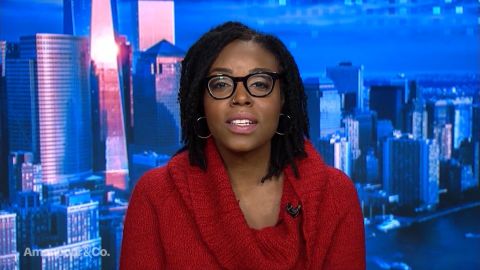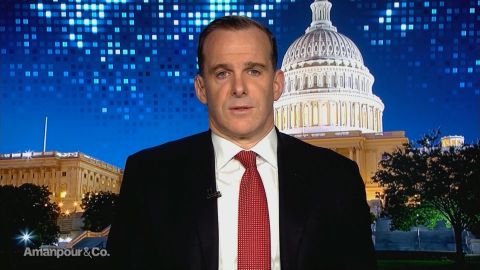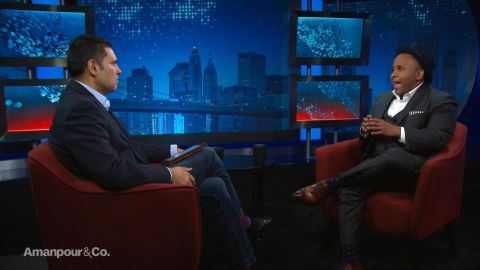Read Transcript EXPAND
CHRISTIANE AMANPOUR: But we’re turning to a day of moral reflection because America is marking Martin Luther King Day but no public holiday for Congress because of this continued shutdown. However, Congress can claim an important marker. For the first time in history, African-Americans hold the same proportion of congressional seats, 12 percent, as their proportion of the population at large. And yet, while more than half a century has passed since Martin Luther King spoke about his American dream, today, racial inequality stubbornly persists. In a moment, how it affects Black millennials when we talk to the author, Reniqua Allen. But first, those fighting for racial justice give us a reality check. Rashad Robinson is the president of the leading nonprofit “Color of Change”. And he tells our Hari Sreenivasan that we need to confront the cause instead of the symptom.
(BEGIN VIDEO TAPE)
HARI SREENIVASAN: For those unfamiliar with your organization, what does “Color of Change” do? What’s its mission?
RASHAD ROBINSON, “COLOR OF CHANGE” PRESIDENT: “Color of Change” is a next generation racial justice organization. And we were founded after Hurricane Katrina, in that moment where Black people were literally on their roofs, begging for the government to do something and were left to die. And the theory behind the start of “Color of Change” was that the movement needed a new type of infrastructure to capture the energy and aspiration and demands of Black folks in their allies at every race. Folks were giving to the Red Cross when they could be working for systemic change. How could we pare technology and media and organizing together to build the type of momentum and power that did the thing that was really at the heart of Katrina where no one was nervous about disappointing Black people, government, corporations and media. And so, idea behind “Color of Change” is how do we translate these wide range of moments that are happening every single day in our society and give people the ability to collectively take action and then translate that action into strategic, cultural and political change.
SREENIVASAN: Well, how do you do that? Is it public pressure? Is it private pressure?
ROBINSON: It’s a mix of both. You know, private pressure, for us, only really works if there is this idea that public pressure is possible. And so, sometimes we have to hold out the idea that public pressure is coming in, sometimes we can work behind the scenes to push our demands, sometimes this — it’s about reward, sometimes it’s about shame. But all of that is about creating a sense that those who are in power need to know that there are consequences for racism, there are consequences for behaviors that put our community in peril.
SREENIVASAN: One of the first instance I remember you guys coming on the field, so to speak, even post Katrina, was when you were able to exert pressure on Glenn Beck. And looking back now, I mean, that was because of some of the comments that he was making, the divisive rhetoric. Looking now — and that was just 2009, and there were nine years after and we have nine-term members of Congress who are just starting to face consequences for things that they have been saying. That episode with Glenn Beck, relatively speaking, seems tame today.
ROBINSON: You know, in some ways it does seem tame. I do think that some of this is ebb and flow. And I do think that while it’s important in the media culture to think about rhetoric, because media is often times about rhetoric, when we look at what’s happening in our Congress with someone like Steve King, I think it’s important that folks are calling out his rhetoric now, although I think more journalists need to ask why now and why not just Steve King. But the larger question is not about folks in power and policymaker’s rhetoric, but actually their policy. What are the impact of the policies that they are putting forth, voting rights, civil rights, like these are all things from criminal justice and immigration that Steve King had a say over. He was able to implement and move racist policies, policies that have deep impact on people’s lives. And so, I really hope that as we move this discussion forward and we talk about sort of the words that we’re able to not just kind of have outrage about those but actually go much deeper and be more clear that it’s the policies that have the real deep impact on people every single day.
SREENIVASAN: Sometimes there’s conception that racism is a generational issue, that it will die out over time, that it will move towards equality. We have those images in Charlottesville, these were young men that were just maybe out of college or a little after that and with their faces full tiki torch light.
ROBINSON: You know, the voting — ever since Lyndon Johnson signed, you know, the Civil Rights Act and the Voting Rights Act, you know, no Democrats that, you know, needed Black votes has gotten a majority of the White vote. We do live in a very deeply divided country, a long race. And I don’t think we get around that by refusing to talk about it or thinking that it will just change overnight. Far too often people, think about inequality as unfortunate, almost like a car accident. And I don’t just mean people who don’t always agree with us on the issues, I mean, lots of people. And so, instead of seeing inequality as unjust, and when you see any quality as unfortunate, so many of the solutions that people think about are charitable solutions, let’s send water bottles to Flint instead of working to actually deal with the pipes, let’s clean up inner city school instead of dealing with public education and making public education equal, let’s deal with reentry —
SREENIVASAN: The symptom versus the cause?
ROBINSON: The symptom versus the cause. And so, part of the challenge that we’ve had over many decades is that we’ve worked to deal with a lot of symptoms and not a lot of causes, and change hasn’t actually happened. And in that sort of era, we haven’t done all of the work to bring people along. At the same time, they are powerful forces in the White House and they are powerful forces in the media, there are powerful forces in our culture that have a lot at stake at keeping the status quo in place, at keeping the rules rigged and keeping us divided in order to do that. And for people of good faith who are watching this, for people who are on the sidelines, you know, the fight to ensure that our democracy allows all of our voices to be counted is not just the fight for Black people, it’s not just a fight for people of color. The attacks that have happened. you know, via racism on our education system, on our health system, on our environment, the way that racism has been used as a wedge has hurt all of society. And the question will be is keeping racist status quo policies in place so beneficial to folks that people are willing to risk their own health, their own environment, their own education and all the other things that have really begun to fall apart because racism has been used as a wedge to breakdown the structures of our society, the ways that we insure that justice is actually served in our systems.
SREENIVASAN: One of the areas that you’re focusing on is social platforms. What are you asking of them? What’s happening there?
ROBINSON: Like many institutions that grow very quickly, there have to be rules of the road. And as we started to deal with platforms like Facebook and watched how they dealt with law enforcement without any rules or regulations, often times bypassing kind of warrants and Civil Rights Law by providing information to — to law enforcement. Really violating the pact that people that people thought they had about privacy with those platforms, the way that algorithms could be used to violate the 1964 Civil Rights Act. Like you could put an ad on Facebook that said I only want to market this house to white people. And — and the way that race was weaponized during the 2016 election, really breaking down, you know, a whole set of trusts about how we think about our elections and how we think about voting and democracy. While we have been engaged with Facebook, really pushing them to do a Civil Rights audit and look at all their policies, put in some real structures about how they think about policies and practices, we found out, via the New York Times, that while they were telling us sort of really great things about what they were going to be doing and talking to us about this audit and hiring the people to do it, they had hired a P.R. firm to attack us at the same time. Employing this firm to sort of move these narratives about who was funding us and that we didn’t have our own ideas which were sort of deeply racist in this idea that like black people don’t control their own ideas. It was like many of the ways that the — you know the Student Nonviolent Coordinating Committee and Dr. King were sort of attacked in the `60s by saying that they were puppets of some larger entity as if they didn’t have their own ideas for fighting for their — for justice. And one of the things that we really need from both our regulators, members of Congress, those that invest in Facebook is to hold the largest communications platform that the world has ever seen – one of the largest corporations out there accountable for basic practices around privacy, around data sharing, around civil rights. And that is going to be incredibly important because they have so much access to so much of our information.
SREENIVASAN: You know, there was a now famous letter from a former employee of theirs, Mark Luckie. As he left the company, he had great statistics on how much more engaged African-Americans are on Facebook, right. All the metrics that Facebook wishes it had about other communities as well, but that it was also not a positive experience for so many of them, because when they would post something, either the algorithm or other people were able to essentially create ways for that content to be censored.
ROBINSON: Well, I mean that’s one of the things that we’ve seen and it’s not just that; it’s organizations having their content blocked. You know, many kind of forces inside of Facebook; conservative forces inside of Facebook have put this idea of conservative bias at the same level as civil rights. And you know, we often times talk about it is that there’s left and there’s right, and there’s right and there’s wrong. And so civil rights is somehow a left issue now. And so, Facebook will do a training for their folks that are monitoring around the election and monitoring the platform around the election. And the same day they do a training on voter suppression, they did a training on voter fraud, which is basically, you know, this, you know, Donald Trump conspiracy theory that’s been advanced by the right. It’s like why don’t you do a training on, you know, is the world flat. And — and the — and the idea that they’ve — they’ve put — they’ve politicized civil rights to such a point where an ad for a pride parade and a pride celebration becomes a political add and not just like an ad for people coming together is an example of many of the ways that Facebook has to sort of recognize and all these platforms have to recognize they’ve got to have a moral rudder. One of the bigger challenges that they’ve had, and this is really a challenge that they’re trying to fight because of what’s happening in Europe is that these companies are trying to avoid any type of regulation at all costs. These companies will have to think very clearly about how they engage in this upcoming 2020 election. Back in 2016 we forced many companies to divest from the RNC convention because of the rhetoric of Donald Trump in the lead up to the election. All of the platforms like Google and Facebook, we got on the phone with them and urged them to divest from the RNC convention. They told us that they were media platforms, that they had to be at both conventions for both sides. Now we’ve seen mark Zuckerburg go to Congress and say that they’re not a media platform. So now what will their excuse be for enabling racism?
SREENIVASAN: There’s also the power of traditional medial whether it’s the news industry or really the entertainment industry. There’s a relatively small group of people in Hollywood that create an manufacture the perception of how life is or how life should be.
ROBINSON: Yes.
SREENIVASAN: So how does an organization like yours tackle that?
ROBINSON: You know, we really think a lot about this. We, a couple of years ago, opened and office in Hollywood and put real energy behind focusing on these images with a larger idea that we do have to change culture. Culture often times proceeds policy shift, and one of the – a couple of things that we really focus on is, you know, we’ve worked with UCLA and USC on a number of reports to really look at both diversity and writers rooms, the writers rooms that create the shows and look at how these shows are created, who’s in the room, who’s writing the stories that reach America. And as a result, what are we missing as a result? And seeing a whole set of challenges in terms of access that black folks, that people of color and women have had to being able to create and write and tell the authentic stories that are going to reach folks. We’re releasing a report that looks at crime on TV and all the crime shows and how they not only portray black people on those shows, but how they portray a criminal justice system that is deeply unfair – that we’ve had folks on the left and the right say is deeply unfair. But our justice system is often times portrayed on TV as just a set of individuals moving forward the law, that the heroes are the folks working inside the system and everyone on the outside is a criminal. You see often times these cases that start with a crime and end with a verdict within an hour when people – when what we really know is people are often time lagging behind bars for months and months and years and years awaiting trials and often times are there not because they are guilty but because they are poor, because they are black, and because they are not powerful.
SREENIVASAN: Here we are more than 50 years after the I Have A Dream speech and you talk about civil rights and you talk about voter rights. Where are we in the longer arch of not even achieving the dream but in the process toward it?
ROBINSON: You know, I think that we’re in a deep struggle right now. I look at many of the rollbacks and many of the ways that voting rights were under attack during this past election in places like Georgia and Florida and elsewhere. I think about the work that we have to do to not just be on the defense of. So much of the work in previous decades was about defending and protecting the things that were won during the 60s. And as a next generation racial justice organization, I really do believe that so much of our work has to be about what – what are the next generation campaigns, the next generation policies that we are putting forth that will allow us to move forward in a more multiracial democracy, a more multiracial society. And so, not just thinking about how do we protect things like the voting rights act, but what is the new voting rights act? What are the policies in states around the country and federally that we need to pushto ensure that not just that we protect the vote, but that we make every voter count, not just every vote count. And for us at Color of Change were constantly sort of thinking about that and thinking about when we ask people to take an action on something that they’re outraged on, something that they’re worried about, how do we translate that into a policy fight? And the politics are not always going to be there. And so, some of that right now has to be about tilling the soil, about putting forward big demands even though we may not yet have the policy but recognizing that we’ll never get there if we refuse to actually be aspirational, if we refuse to actually put forward what we really want.
SREENIVASAN: Rashad Robinson, Color of Change, thanks so much.
ROBINSON: Thanks for having me.
About This Episode EXPAND
Christiane Amanpour speaks with Bret McGurk about ISIS; and author Reniqua Allen. Hari Sreenivasan speaks with Rashad Robinson about fighting racial injustice.
LEARN MORE


